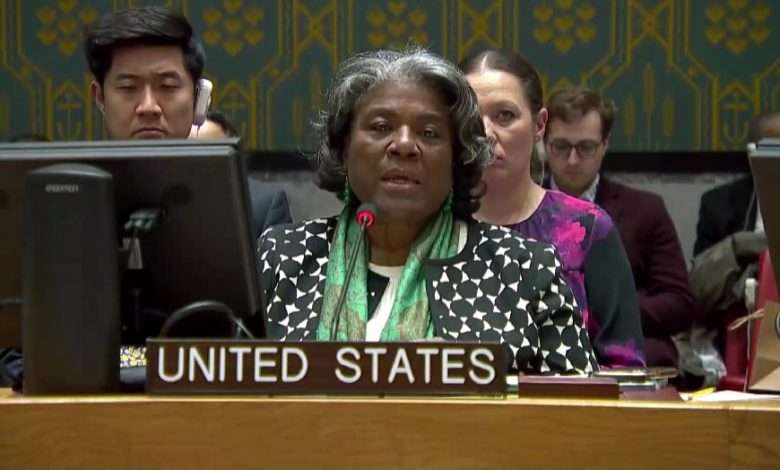Remarks by Ambassador Linda Thomas-Greenfield at a UN Security Council briefing on the humanitarian situation in Ukraine

Ambassador Linda Thomas-Greenfield
US Representative to the United Nations
New-York, New-York
March 17, 2023
AS DELIVERED
Thank you Mr President. And thank you, Under-Secretary-General Griffiths, for your thorough briefing and for the efforts of the United Nations to secure an extension of the Black Sea Grains Initiative.
Colleagues, as Under-Secretary General Griffiths has clearly outlined, as long as Russia continues to blockade Ukrainian ports, the world needs the Black Sea Grains Initiative. The Black Sea Grain Initiative lowers global food prices. It calms market volatility. It improves global food security. It saves lives. It must go on, reliably and sustainably.
The initiative must be able to work efficiently. It must operate at a pace that matches global demand. The delays imposed by Russia have already reduced the number of ships leaving port and increased transport costs.
We agree with what the Secretary-General said during his visit to Kiev two weeks ago: the initiative aims to enable the widest possible use of the Black Sea export infrastructure. Only three ports are currently open while food prices around the world remain at historic highs.
Food exports from Ukraine fell by more than a third compared to last year. Russia’s war of aggression in Ukraine has already disrupted the global food supply chain and caused food price spikes that have pushed many more into extreme poverty. The world needs this grain. It has to flow freely.
Since the initiative began, more than 24 million tonnes of grain and oilseeds have been shipped around the world, including humanitarian assistance through the World Food Program to the most food insecure.
During his trip to Africa last week, Foreign Minister Blinken saw sacks of wheat – gifts from the Ukrainian people – that had been shipped to Ethiopia because of the Black Sea Grains Initiative. This is grain that can feed the world. This is the crucial help that is at stake.
We know, and the rest of the world knows, that Russia’s food exports are at least as high as they were before the war. When we hear from the Russian government that it is barred from exporting grain and fertilizers, the numbers show that this is simply not true.
And when it comes to sanctions, we have made extraordinary efforts to communicate the clear food and fertilizer carveouts to governments and the private sector. Put simply, sanctions are not the problem.
Beyond the Black Sea Grains Initiative, the Council must also focus on the ongoing devastation and urgent humanitarian needs caused by Russia’s war in Ukraine. On February 15, the UN announced that UN agencies and NGOs will need $3.9 billion to bring humanitarian aid to Ukraine. This does not include the additional $1.7 billion to support countries hosting millions of Ukrainian refugees.
For our part, the United States has provided almost $2 billion in humanitarian assistance to those in need in Ukraine and the region since the invasion. And we have provided nearly $15.5 billion in direct budget support to the government of Ukraine through World Bank mechanisms. We plan to commit an additional $7.4 billion by September.
We make our contribution. And we call on the rest of the international community to do theirs. We should all dig deep. And we must do this without sacrificing a dime to the many other urgent humanitarian crises around the world.
However, funding alone is not enough. Security Council members must continue to demand unhindered humanitarian access throughout Ukraine, as 141 member states did last month. And we must highlight Russia’s ongoing missile and drone attacks on civilians and critical infrastructure, and how these attacks prevent humanitarian aid from reaching temporarily Russian-occupied territories.
Just last week, massive attacks destroyed residential buildings, power infrastructure and railroads, killing at least 11 civilians. This was also the 16th major attack on Ukraine’s energy infrastructure in the past five months, showing blatant disregard for nuclear safety.
Russia’s attacks have even resulted in the deaths and injuries of humanitarian workers. And women and girls in particular are facing a frightening, dramatic rise in human trafficking and gender-based violence as they try to flee for their lives. Today, as we conclude the Commission on the Status of Women, let us all commit to holding the Russian armed forces accountable for these atrocities.
Dear colleagues, there is of course a way to prevent further suffering immediately. Russia can heed the demands of the UN and world member states for an immediate, full and unconditional withdrawal from Ukraine. Until then, let’s do whatever we can to help the people of Ukraine and all those who have been hurt by the aftermath of this terrible, unnecessary war.
Thank you Mr President.
###


